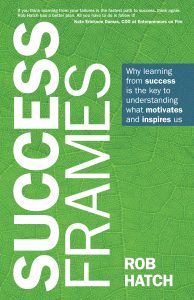By Rob Hatch, business coach and author
As leaders and business owners, we’ve embraced the idea that failure is a deep well of knowledge. And who among us could argue? Bill Gates shared his wisdom: “It’s fine to celebrate success, but it is more important to heed the lessons of failure.”
Contrary to many quotes you will find extolling the lessons gleaned from falling short, new research suggests that we learn less from our failures and that success is a better teacher.
When leading an organization, we want to build on what works. Success, even in small wins stacked together, shows us the way. I don’t know when we elevated failure to its tenured status. It may have been with the best of intentions. After all, we know and understand that people will make mistakes. We don’t want people to fear failure. But in the end, failure’s instructions are often not a rich source of information.
Failure may help us identify where to look when something goes awry, but rarely does failure show us the way forward. It doesn’t instruct us on how to fix the problem. Failure doesn’t give us something upon which we can build.
I’ve never found failure all that helpful. I don’t avoid it. I am not afraid of it. It happens…a lot. I’ve never felt I’ve gained as many valuable insights from failing as I have when I get things right.
Success, after all, teaches us what works. When we get things right, we are strengthening our neural pathways. As we practice and get it right, the stronger the neural connections, the better we become. If you’ve ever attempted to learn how to play an instrument, you know you will play the wrong notes.
 For example, in the early days of learning to play a saxophone, it’s unlikely to sound very good. Your fingers fumble. You struggle to activate all the right muscles in your lips, tongue, and jaw. All of this means lots of squeaky and painful notes.
For example, in the early days of learning to play a saxophone, it’s unlikely to sound very good. Your fingers fumble. You struggle to activate all the right muscles in your lips, tongue, and jaw. All of this means lots of squeaky and painful notes.
Anyone teaching you will likely offer suggestions and corrections based on what they know works. Eventually, you get it right and play a note clearly and cleanly. And there’s a moment of excitement at finally getting it right. You can hear the note. And you can feel it in your bones. You now know how to play a C on the saxophone.
And when you play that perfect note, your teacher likely takes a moment to point out everything you did to get it right. For example, they note your posture, hand placement, and how you positioned your lips on the mouthpiece.
They also know how important it is to establish this moment as a marker of mastery because getting it right helps us to progress to the next level.
Framing Success
One of the reasons we fail to learn from failure is because it threatens our ego. We don’t enjoy revisiting what went wrong. As such, we avoid taking time to examine our failures.
We can’t overlook the importance of self-esteem. When learning something new, your first instinct isn’t to review all your failures each time you practice. You won’t pore over each missed note to help you reach the next level.
Instead, you’ll start from what you know, what you got right, and build from there. Your apprehension about learning to play a new instrument on day one likely looks different on day two.
Day two might be learning to play a B, something you’ve never done before. But you’ve already demonstrated that you can successfully play a C. You know how to hold the instrument. You know where your hands should be. You know how to position your mouth. There’s a confidence that comes from having established a certain level of skill. Even after one day, you have something upon which you can build.
You’re still likely to squeak and squeal your way through for a bit. But the next note will come faster because you have a framework for success to support you.
Success isn’t just a great teacher; it helps us build a platform for approaching the next challenge.
Build on what works
In my work as a coach, sessions are often opportunities for clients to reflect on their work. Sometimes, I ask people to describe the steps of a recent success. Other times, I point them out as they talk about an accomplishment.
You have a method. You have a way of approaching challenges and solving problems. You have a method for how you work best.
In fact, you are so good at it that you may not even realize how you do what you do. After all, it’s just…what you do.
But there’s power in reflecting on how you achieved success. Naming the steps of your process and your choices in accomplishing something provides insight. The goal is to build a framework to support you whenever you approach a new challenge.
Extract the Lessons
Look at something you completed successfully. Think of a project, a task, a sales call, or how you resolved a situation with a challenging employee.
Here are some questions to consider.
What were the steps you took? Name them.
What did you do or say?
Why did you make that choice?
Why do you think it worked?
What did you do next?
What was the result?
Was it what you expected?
And then what happened?
What did you do or say next?
Why did you choose to do that?
This isn’t a formula. These questions aren’t in any order. It’s also not an exhaustive list. Use the questions that work for the situation. Each question should anchor you in your actions and decisions to help you extract the lessons of your success. We don’t need to be afraid of failure, but success has so much more to offer when it comes to learning and building on what works.

Rob Hatch is a business coach and author of Success Frames: Why Learning From Success Is The Key To Understanding What Motivates And Inspires Us, which is out on 5th December, published by Practical Inspiration Publishing, priced at £24.99.


